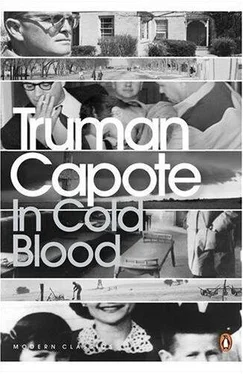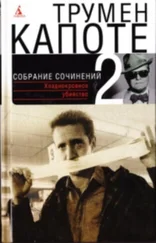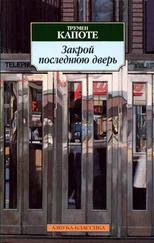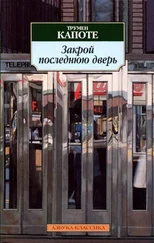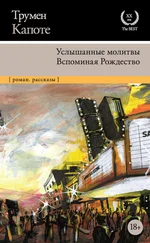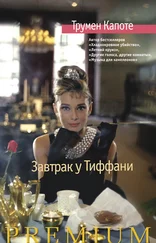Трумен Капоте - In Cold Blood
Здесь есть возможность читать онлайн «Трумен Капоте - In Cold Blood» весь текст электронной книги совершенно бесплатно (целиком полную версию без сокращений). В некоторых случаях можно слушать аудио, скачать через торрент в формате fb2 и присутствует краткое содержание. Год выпуска: 2000, ISBN: 2000, Издательство: Penguin, Жанр: Современная проза, на английском языке. Описание произведения, (предисловие) а так же отзывы посетителей доступны на портале библиотеки ЛибКат.
- Название:In Cold Blood
- Автор:
- Издательство:Penguin
- Жанр:
- Год:2000
- ISBN:0-14-118257-1 / 978-0-14-118257-5
- Рейтинг книги:4 / 5. Голосов: 2
-
Избранное:Добавить в избранное
- Отзывы:
-
Ваша оценка:
- 80
- 1
- 2
- 3
- 4
- 5
In Cold Blood: краткое содержание, описание и аннотация
Предлагаем к чтению аннотацию, описание, краткое содержание или предисловие (зависит от того, что написал сам автор книги «In Cold Blood»). Если вы не нашли необходимую информацию о книге — напишите в комментариях, мы постараемся отыскать её.
In Cold Blood — читать онлайн бесплатно полную книгу (весь текст) целиком
Ниже представлен текст книги, разбитый по страницам. Система сохранения места последней прочитанной страницы, позволяет с удобством читать онлайн бесплатно книгу «In Cold Blood», без необходимости каждый раз заново искать на чём Вы остановились. Поставьте закладку, и сможете в любой момент перейти на страницу, на которой закончили чтение.
Интервал:
Закладка:
Now a young girl, probably twelve, was drawing figures in the sand, carving out big, crude faces with a piece of driftwood. Dick, pausing to admire her art, offered the shells he had gathered. "They make good eyes," he said. The child accepted the gift, where upon Dick smiled and winked at her, He was sorry he felt as he did about her, for his sexual interest in female children was a failing of which he was "sincerely ashamed" - a secret he'd not confessed to anyone and hoped no one suspected (though he was aware that Perry had reason to), because other people might not think it "normal." That, to be sure, was something he was certain he was - "a normal." Seducing pubescent girls, as he had done "eight or nine" times in the last several years, did not disprove it, for if the truth were known, most real men had the same desires he had. He took the child's hand and said, "You're my baby girl. My little sweetheart." But she objected. Her hand, held by his, twitched like a fish on a hook, and he recognized the astounded expression in her eyes from earlier incidents in his career. He let go, laughed lightly, and said, "Just a game. Don't you like games?"
Perry, still reclining under the blue umbrella, had observed the scene and realized Dick's purpose at once, and despised him for it; he had "no respect for people who can't control themselves sexually," especially when the lack of control involved what he called "pervertiness" - "bothering kids,"
"queer stuff," rape. And he thought he had made his views obvious to Dick; indeed, hadn't they almost had a fist fight when quite recently he had prevented Dick from raping a terrified young girl? However, he wouldn't care to repeat that particular test of strength. He was relieved when he saw the child walk away from Dick.
Christmas carols were in the air; they issued from the radio of the four women and mixed strangely with Miami's sunshine and the cries of the querulous, never thoroughly silent seagulls. "Oh, come let us adore Him, Oh, come let us adore Him": a cathedral choir, an exalted music that moved Perry to tears - which refused to stop, even after the music did. And as was not uncommon when he was thus afflicted, he dwelt upon a possibility that had for him "tremendous fascination": suicide. As a child he had often thought of killing himself, but those were sentimental reveries born of a wish to punish his father and mother and other enemies. From young manhood onward, however, the prospect of ending his life had more and more lost its fantastic quality. That, he must remember, was Jimmy's "solution," and Fern's, too. And lately it had come to seem not just an alternative but the specific death awaiting him.
Anyway, he couldn't see that he had "a lot to live for." Hot islands and buried gold, diving deep in fire-blue seas toward sunken treasure - such dreams were gone. Gone, too, was "Perry O'Parsons," the name invented for the singing sensation of stage and screen that he'd half-seriously hoped some day to be. Perry O'Parsons had died without having ever lived. What was there to look forward to? He and Dick were "running a race without a finish line" - that was how it struck him. And now, after not quite a week in Miami, the long ride was to resume. Dick, who had worked one day at the ABC auto-service company for sixty-five cents an hour, had told him, "Miami's worse than Mexico. Sixty-five cents! Not me. I'm white." So tomorrow, with only twenty-seven dollars left of the money raised in Kansas City, they were heading west again, to Texas, to Nevada - "nowhere definite."
Dick, who had waded into the surf, returned. He fell, wet and breathless, face down on the sticky sand. "How was the water?"
"Wonderful."
The closeness of Christmas to Nancy Clutter's birthday, which was right after New Year's, had always created problems for her boy friend, Bobby Rupp. It had strained his imagination to think of two suitable gifts in such quick succession. But each year, with money made working summers on his father's sugar-beet farm, he had done the best he could, and on Christmas morning he had always hurried to the Clutter house carrying a package that his sisters had helped him wrap and that he hoped would surprise Nancy and delight her. Last year he had given her a small heart-shaped gold locket. This year, as forehanded as ever, he'd been wavering between the imported perfumes on sale at Norris Drugs and a pair of riding boots. But then Nancy had died.
On Christmas morning, instead of racing off to River Valley Farm, he remained at home, and later in the day he shared with his family the splendid dinner his mother had been a week preparing. Everybody - his parents and every one of his seven brothers and sisters - had treated him gently since the tragedy. All the same, at meal times he was told again and again that he must please eat. No one comprehended that really he was ill, that grief had made him so, that grief had drawn a circle around him he could not escape from and others could not enter - except possibly Sue. Until Nancy's death he had not appreciated Sue, never felt altogether comfortable with her. She was too different - took seriously things that even girls ought not to take very seriously: paintings, poems, the music she played on the piano. And, of course, he was jealous of her; her position in Nancy's esteem, though of another order, had been at least equal to his. But that was why she was able to understand his loss. Without Sue, without her almost constant presence, how could he have withstood such an avalanche of shocks - the crime itself, his interviews with Mr. Dewey, the pathetic irony of being for a while the principal suspect?
Then, after about a month, the friendship waned. Bobby went less frequently to sit in the Kidwells' tiny, cozy parlor, and when he did go, Sue seemed not as welcoming. The trouble was that they were forcing each other to mourn and remember what in fact they wanted to forget. Sometimes Bobby could: when he was playing basketball or driving his car over country roads at eighty miles an hour, or when, as part of a self-imposed athletic program (his ambition was to be a high-school gymnastics instructor), he took long-distance jog-trots across flat yellow fields. And now, after helping clear the dining table of all its holiday dishes, that was what he decided to do - put on a sweatshirt and go for a run.
The weather was remarkable. Even for western Kansas, renowned for the longevity of its Indian summers, the current sample seemed far-fetched - dry air, bold sun, azure sky. Optimistic ranchers were predicting an "open winter" - a season so bland that cattle could graze during the whole of it. Such winters are rare, but Bobby could remember one - the year he had started to court Nancy. They were both twelve, and after school he used to carry her book satchel the mile separating the Holcomb school-house from her father's farm ranch. Often, if the day was warm and sun-kindled, they stopped along the way and sat by the river, a snaky, slow-moving, brown piece of the Arkansas.
Once Nancy had said to him, "One summer, when we were in Colorado, I saw where the Arkansas begins. The exact place. You wouldn't believe it, though. That it was our river. It's not the same color. But pure as drinking water. And fast. And full of rocks. Whirlpools. Daddy caught a trout." It had stayed with Bobby, her memory of the river's source, and since her death... Well, he couldn't explain it, but whenever he looked at the Arkansas, it was for an instant transformed, and what he saw was not a muddy stream meandering across the Kansas plains, but what Nancy had described - a Colorado torrent, a chilly, crystal trout river speeding down a mountain valley. That was how Nancy had been: like young water - energetic, joyous.
Usually, though, western Kansas winters are imprisoning, and usually frost on the fields and razory winds have altered the climate before Christmas. Some years back snow had fallen on Christmas Eve and continued falling, and when Bobby set out the next morning for the Clutter property, a three-mile walk, he had had to fight through deep drifts. It was worth it, for though he was numbed and scarlet, the welcome he got thawed him thoroughly. Nancy was amazed and proud, and her mother, often so timid and distant, had hugged and kissed him, insisting that he wrap up in a quilt and sit close to the parlor fire. While the women worked in the kitchen, he and Kenyon and Mr. Clutter had sat around the fire cracking walnuts and pecans, and Mr. Clutter said he was reminded of another Christmas, when he was Kenyon's age: "There were seven of us. Mother, my father, the two girls, and us three boys. We lived on a farm a good ways from town. For that reason it was the custom to do our Christmas buying in a bunch - make the trip once and do it all together. The year I'm thinking of, the morning we were supposed to go, the snow was high as today, higher, and still coming down - flakes like saucers. Looked like we were in for a snowbound Christmas with no presents under the tree. Mother and the girls were heart-broken. Then I had an idea." He would saddle their huskiest plow horse, ride into town, and shop for everybody. The family agreed. All of them gave him their Christmas savings and a list of the things they wished him to buy: four yards of calico, a foot-ball, a pincushion, shotgun shells - an assortment of orders that took until nightfall to fill. Heading homeward, the purchases secure inside a tarpaulin sack, he was grateful that his father had forced him to carry a lantern, and glad, too, that the horse's harness was strung with bells, for both their jaunty racket and the careening light of the kerosene lantern were a comfort to him.
Читать дальшеИнтервал:
Закладка:
Похожие книги на «In Cold Blood»
Представляем Вашему вниманию похожие книги на «In Cold Blood» списком для выбора. Мы отобрали схожую по названию и смыслу литературу в надежде предоставить читателям больше вариантов отыскать новые, интересные, ещё непрочитанные произведения.
Обсуждение, отзывы о книге «In Cold Blood» и просто собственные мнения читателей. Оставьте ваши комментарии, напишите, что Вы думаете о произведении, его смысле или главных героях. Укажите что конкретно понравилось, а что нет, и почему Вы так считаете.
